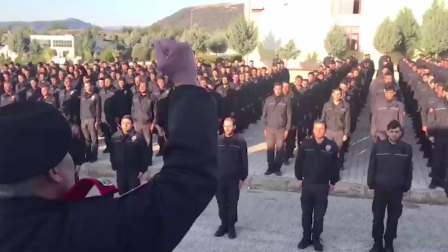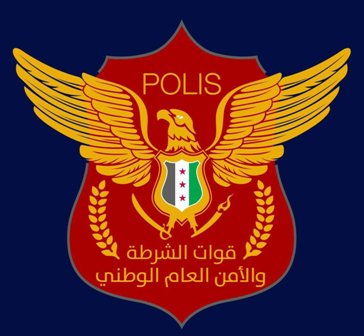The Turks continue enforcing their rules over a vast territory north of the Syrian city of Aleppo. Their behavior in the areas liberated from ISIL looks very much like colonization. Military administrations are being gradually replaced with “local governments” but the Turkish forces that invaded Syria in the framework of the Euphrates Shield operation do not seem to be keen to go back home.
Instead, they are training “Syrian policemen” and guards for local administrations and for this purpose, they are recruiting mostly Islamist fighters. Soldiers from the Free Syrian Army are being retrained to be agents of the Free Syrian Police (FSP). In late January 2017, the first 450 free Syrian policemen were sent to Jarablus. According to the Turks, that force consists of Syrian refugees from Gaziantep and Kilis (Turkey).
But when taking the oath, those men shouted “Long Live Turkey!” and “Long Live Erdogan!”


That happened a month before Feb 23, when the General Staff of the Turkish Army officially announced the end of the Euphrates Shield.
Once turned into policemen, the Jarablus-based “moderate” fighters began acting in Azaz, Al-Rai, Mare, Suran and Al-Bab. As of now, there are almost 2,000 retrained fighters in the north of Syria. According to FSP “Lieutenant General” Vail Fuad, for efficient law enforcement over the liberated areas, they need over 5,000 policemen.
A policeman is paid up to 600 Turkish pounds, nearly $200, which is enough to meet the needs of a five-member family (1).
Among the sponsors may well be some of the Gulf monarchies. The money is paid by the Turkish government in TRY. But this is not the only fact proving that Turkey is “colonizing” the north of Syria. Almost 2,500 square kilometers north of Aleppo have been placed under Turkey’s close military and economic control, with the area near Al-Bab proclaimed as “security zone.”
The goal of Recep Tayyip Erdogan’s Euphrates Shield initiative was to create a 5,000-square-kilometer “security zone” in Syria south of Gaziantep and Kilis. The Turkish president planned to go as far as the YPG-controlled Manbij but was forced to stop in Al-Bab.
Erdogan was enraged to see Russia and the United States having put a barrier on his way to Manbij but he had no guts to confront them. So, he began establishing his rule over the “security zone.” Erdogan has not forgotten about the Kurds – the key target of his operation – and is actively preparing for an attack on Afrin. His army has already driven a wedge between the Kurdish cantons of Afrin and Kobani – the Azaz-Jarablus-Al-Bab triangle is a good springboard for the Turks to push Kurds out of the northwest of Aleppo province.
On Mar 23, Erdogan reminded the Russians and the Americans of the need to have no Kurdish troops in the war zones in Syria. He said that he was sad to see the Russians and the Americans supporting YPG. And he added that nobody could tell Turkey to withdraw its troops (from Syria) anymore.
So, in fact, Erdogan has officially confirmed his wish to stay in the north of Syria for long.
For this purpose, he is going to apply the method tested in the north of Cyprus. Just like in Cyprus, his foothold in the north of Syria will be local Turks. Syrian Turkmens constitute the core of FSP. The fighters of the Sultan Murad Division and the Nour al-Din al-Zenki Movement have now been turned into policemen “legally hired” for implementing the “high mission” to enforce law over the territories liberated from ISIL. Turkmens are not the only ethnic group recruited in FSP. The Turks do not mind seeing Arabs there. What they mind is seeing Kurds in Afrin.
Their goal now is to occupy Afrin. In exchange for their consent to Kurdish presence in the northeast of Syria and continued ceasefire talks with Russia and Iran, they expect certain concessions from Russia and the United States. One of them is permission to force Kurds out of Afrin, a Kurdish enclave controlled by the Syrian Government. The Turks also want the Russians to break up their contacts with Syrian Kurds and to give up their attempts to involve them into the Syrian peace talks. And they have already received one sign: the closure of the Moscow office of the Democratic Union of Syrian Kurds.
The pretext for Turkey’s invasion of Syria was the Aug 2016 terrorist act in Gaziantep. Now too the Turks may find some casus belli for attacking Afrin. The last report of an Afrin-based sniper killing a Turkish soldier and the noise the Turks made over it (2) may well be part of this tactics. After the incident, the Turks even met with Russia’s charge d’affaires in Ankara and told him that they were very much worried about it. Their true goal was to see if Russia is inclined to support their plans on the Syrian Kurds or not.
Erdogan has one more reason on his mind: very soon, on Apr 16, the Turks are to vote on whether Turkey should transit from parliamentary to presidential rule. In fact, this will be a kind of new vote of confidence in Erdogan. Enjoying the Turks’ support for what he is doing at home, he now needs their confidence in what he is going to do outside his country. And the “Long Live Erdogan!” call issued by his new “policemen” in the north of Syria was the first display of that confidence.
In the meantime, the Turks are trying to put their own faults on the others. While the Turkish army and special services are actively “colonizing” the north of Syria, Turkish Foreign Minister Mevlut Cavusoglu is blaming Russia and the United States for “competing for control” of what is going on in that country.
In an interview to TRT, he said that Russia and the United States are competing for control over terrorist organizations, particularly, Kurdish YPG and PYD.
He added that both great powers have momentary rather than long-term goals in Syria and do not care for Syria’s future. All they need, according to Cavusoglu, is short-term prevalence. “Turkey cannot let other countries support terrorists in Syria for their own purposes,” the Turkish foreign minister said.
What can we say? It seems that such accusations are the only way for Cavusoglu to justify his country’s policy in Syria – a policy aimed at reorganizing gangs into police units and defaming the sovereignty of a neighbor state. Here Turkey appears to a true “trendsetter.”
(1) Khaled al-Khateb, Free Syrian Army getting backup from Turkish-trained police // Al-Monitor, March 23, 2017.
(2) On Mar 22, the General Staff of the Turkish Army reported that the killing of a Turkish soldier by a sniper from the territory controlled by the Kurdish YPG. The report appeared two days after a YPG representative’s statement that Russia had established a “military base” in the northeast of Syria, near Afrin. Russia’s Defense Ministry refuted that information on the same day.
EADaily’s Middle East Bureau

 Military correspondents appreciated the Kremlin's "sanctions" move with the United States — it won't seem enough to Europe
Military correspondents appreciated the Kremlin's "sanctions" move with the United States — it won't seem enough to Europe "Crowd noise", cannabis instead of bread, Zelensky and Lukashenko: morning coffee with EADaily
"Crowd noise", cannabis instead of bread, Zelensky and Lukashenko: morning coffee with EADaily The White House commented on Zelensky's statement about Trump's injustice
The White House commented on Zelensky's statement about Trump's injustice It became known who Medinsky met at an unannounced meeting in Geneva
It became known who Medinsky met at an unannounced meeting in Geneva About negotiations with the United States and the Kremlin's naivety: Is the example of Venezuela not enough for you?
About negotiations with the United States and the Kremlin's naivety: Is the example of Venezuela not enough for you? Zelensky wants to be cool, like Putin — Panchenko
Zelensky wants to be cool, like Putin — Panchenko RT Prosecutor General: Murder of Tajik border guards and Chinese workers is a provocation
RT Prosecutor General: Murder of Tajik border guards and Chinese workers is a provocation